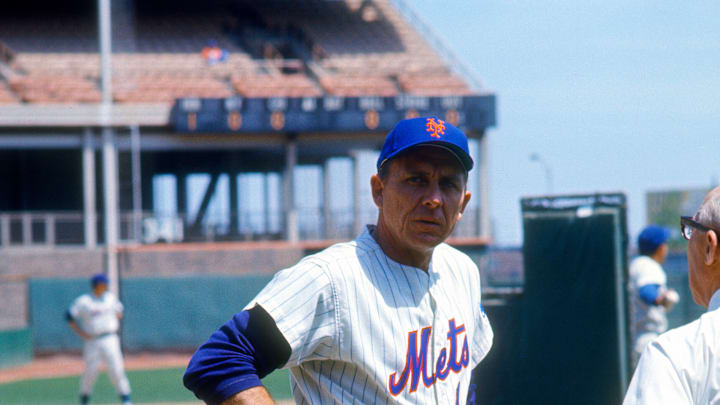So the great Brooklyn Dodgers player, and New York Mets manager, Gil Hodges finally gets his due. The great wrong has been righted, and Hodges will now have his plaque in the Baseball Hall of Fame in Cooperstown, New York.
My grandparents were the ones who were ardent Mets fans, long-time season ticket holders, and I got to go to many games with them at Shea Stadium. But long before they were Mets loyalists, they were Brooklyn Dodgers fans…fanatics really…and they schooled me on what the Dodgers meant to them, to the fans, to the Borough of Brooklyn.
My grandparents were a part of what was known as the Section 8 Club, a group of fans who would not only make themselves fixtures at Ebbetts Field in Brooklyn, but would also follow the Dodgers when they went on the road in the days when St. Louis was the furthest west you had to travel for a Major League Baseball game. It would be much like the 7 Line is for the Mets today.
Players were more accessible back then, and according to my grandparents, there was nobody more accessible than Gil Hodges. Hodges always made it a point to engage with the Section 8 Club when the team was at home, and would sit and have dinner with the group when the team was on the road.
Although there were some bigger personalities on “dem Bums” – guys like Pee Wee Reese, Duke Snider, Carl Furillo – Hodges was the favorite of the people closest to the team. He was quiet and unassuming, but larger than life. My grandfather would say that Hodges had the biggest hands – they were, themselves, like baseball mitts. He was a tough, no nonsense, ex-Marine who had two years of active service in WWII and was awarded a Bronze Star, yet he was a kind, gentle and compassionate soul.
My grandparents, who would always associate him more with his days in Brooklyn, would speak about Hodges with love and admiration. He would return to New York, after moving with the Dodgers to Los Angeles, to become one of the original Mets in 1962. But his time with the Mets was more compelling years later when he was brought back by the organization to manage in 1968.
The team was brutal in those early years, and Hodges would be the perfect person to turn things around, and he did, leading them to the improbable, winning the 1969 World Series. And while the Brooklyn faithful will always revere him as a member of Dodgers, Mets fans will always associate the name of Gil Hodges with the Miracle of 1969.
It turned out he was more than just a manager to the young New York Mets players.
I watched Tom Seaver, another ex-Marine, break down and cry during a national television interview when asked to talk about Gil Hodges as his mentor. I witnessed Ron Swoboda lose his composure on stage when he told an audience how he was a young maverick as a player and should have listened more to Hodges during his playing days. I listened to Cleon Jones get choked up while he told the story about how Hodges stopped a game during the 1969 season, walked out to left field, and brought Jones with him back to the dugout.
While some will argue that Hodges’ numbers fall just shy of Hall of Fame worthiness – .273 batting average, 370 home runs, 1,274 RBI, 10 consecutive years of averaging over 100 RBI, eight-time All-Star, three consecutive Gold Glove awards ( the first three years of the award) – they are VERY comparable to Pittsburgh Pirates slugger and Mets broadcaster Ralph Kiner who was enshrined in 1975.
Having never seen him play, I relied on my grandfather's stories about Hodges' skills. And he was always adamant that Hodges was one of the best he had ever seen, and truly up there with the greats of the game. Much like Kiner did in his brief career, Hodges dominated during a 10-span from 1947-1956. And while Hodges was a great fielding first baseman, he actually came up as a catcher and was an astute field general.
As a Mets manager, Hodges won 339 games and had a .523 winning percentage. And in the biggest “What if?” in Mets history, what IF Hodges did not suddenly pass away from a heart attack just before Opening Day 1972? The entire course of Mets history most likely would have been changed.
He’s been gone a long time, cut down at a young age, but his memory is still a big part of the Borough of Brooklyn, in the hearts of those Dodgers fans, and the Mets fans who were able to enjoy his presence and brilliance, even if for just a short time.
As a manager, as an authority figure, Hodges was someone extra special to the young players, he was truly loved and revered. He was a gifted player who was the anchor in the middle of a potent Dodgers lineup, and a quiet leader that all of the others looked to and leaned on in the clubhouse. He earned respect from his performance, and the way he conducted himself both on and off the ballfield. And he has finally gotten the respect he so rightly deserved for such a long, long time.
